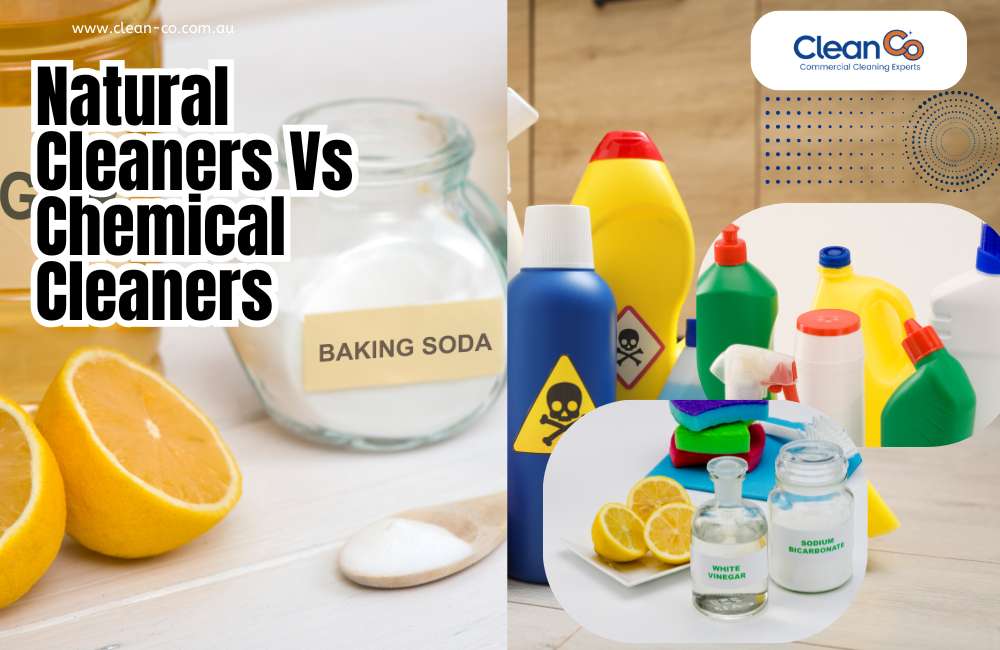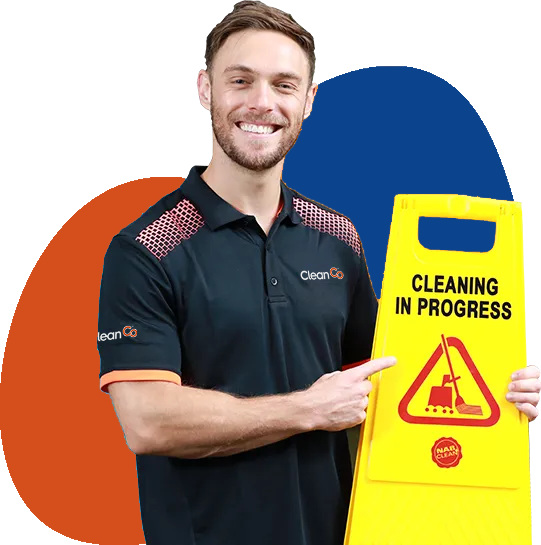Every business takes pride in presenting a clean, welcoming space. Whether it’s an office in the Sydney CBD, a childcare centre in the suburbs, or a gym in the Northern Beaches, cleanliness isn’t just about appearance—it’s about health, safety, and trust.
But here’s the question many business owners are asking: Should we be using natural cleaners or chemical cleaners?
The rise of eco-friendly practices has pushed many organisations to reconsider what goes into their cleaning cupboards. On one hand, natural products promise safety and sustainability. On the other, chemical cleaners are tried and tested when it comes to killing germs and delivering industrial-strength results.
The truth? The “better” option depends on your priorities—whether that’s health, environmental impact, cost, or compliance. Let’s take a closer look at both.
Understanding the Two Cleaning Philosophies
The Power of Nature: What Are Natural Cleaners?
Natural cleaners are made from ingredients derived from renewable, plant-based, or biodegradable sources. They’re designed to remove dirt, grease, and odours without the use of harsh synthetic chemicals.
Common natural cleaning ingredients include:
- Vinegar: excellent for breaking down grease and mild stains.
- Baking soda: ideal for deodorising and gentle scrubbing.
- Citric acid (from citrus fruits): effective against soap scum and mineral deposits.
- Plant-based surfactants: found in many eco-friendly commercial products, helping lift dirt without toxic residues.
These products are especially appealing for businesses concerned about staff wellbeing, children, pets, or clients with sensitivities. They’re also viewed as a safer, more sustainable choice—fitting neatly into corporate sustainability goals.
The Strength of Science: What Are Chemical Cleaners?
Chemical cleaners are synthetic products engineered for specific cleaning tasks. They’ve long been the industry standard, thanks to their proven ability to remove tough stains, sanitise surfaces, and eliminate pathogens.
Some common examples include:
- Bleach (sodium hypochlorite): powerful for whitening and disinfecting.
- Ammonia: widely used for glass and surface cleaning.
- Quaternary ammonium compounds (quats): a go-to for hospital-grade disinfection.
- Chlorine-based products: strong germicidal action for medical and industrial settings.
Businesses often rely on these products in high-risk areas because of their regulatory approvals and effectiveness against a wide range of bacteria, viruses, and fungi.
A Head-to-Head Comparison: Breaking Down the Key Differences
Effectiveness & Germ-Killing Power
- Natural cleaners: Perfect for daily cleaning tasks—removing dust, light grime, and neutralising odours. For example, vinegar with 5% acetic acid has been shown to kill certain bacteria like E. coli and Salmonella, but it’s not classified as a hospital-grade disinfectant.
- Chemical cleaners: Specifically formulated to meet strict standards for disinfection. Products containing quats or bleach are proven to kill 99.9% of viruses and bacteria, making them indispensable in medical clinics, gyms, and food preparation areas.
- Takeaway: If your goal is everyday cleaning and fresh air quality, natural products can handle the job. But for environments that demand strict hygiene protocols, chemicals are often required.
Health & Safety: Protecting Employees, Clients, and the Air
- Natural cleaners: Safe for people and pets, non-toxic, and less likely to trigger allergies or respiratory irritation. They’re particularly important in childcare centres, aged care facilities, and offices where staff spend long hours indoors. A naturally cleaned space often smells fresher, without the harsh chemical odours that can linger.
- Chemical cleaners: While highly effective, they come with risks. Exposure to strong chemical fumes can irritate eyes, skin, and lungs, and prolonged exposure may have long-term health impacts. Proper ventilation, protective gloves, and safety procedures are necessary when using them.
- Takeaway: For sensitive environments, natural cleaners are the safer choice. For high-risk areas, chemical cleaners must be used with strict safety measures.
Environmental Impact: A Sustainable Choice?
- Natural cleaners: Most are biodegradable and have minimal impact on waterways or air quality. Choosing eco-certified products can also contribute to your organisation’s green credentials and environmental reporting.
- Chemical cleaners: Many contain non-biodegradable ingredients that can pollute waterways and harm ecosystems if not disposed of properly. Their manufacturing and packaging also carry a larger carbon footprint.
- Takeaway: From an environmental perspective, natural cleaners clearly lead. However, industries that require strict disinfection may need to balance sustainability with compliance.
Cost & Accessibility
- Natural cleaners: If you’re mixing vinegar, baking soda, or lemon juice at home, the cost is minimal. However, when it comes to large-scale commercial cleaning, professional-grade eco-friendly products can be more expensive than standard chemicals. That said, businesses often see indirect savings—fewer staff sick days from exposure to harsh fumes, better indoor air quality, and improved staff wellbeing all contribute to long-term value.
- Chemical cleaners: Generally cheaper and easier to source in bulk. Supermarkets, wholesalers, and commercial suppliers carry a wide range at competitive prices. The hidden costs, however, can include the need for protective equipment, proper storage facilities, and safe disposal measures, especially for stronger chemical solutions.
- Takeaway: For businesses weighing up cost alone, chemicals might look like the cheaper option. But if you factor in health, safety, and sustainability goals, natural products may provide a better return over time.
The Best of Both Worlds: A Strategic Hybrid Approach
The debate doesn’t need to be “all or nothing.” In fact, the smartest approach for most businesses is a hybrid model—using natural products where possible and reserving chemical disinfectants for areas or situations that demand them.
This is exactly how many professional cleaning companies, including Clean Co, work with their clients.
- Daily Maintenance: Natural, non-toxic cleaners are used for routine tasks in offices, classrooms, and retail spaces. This keeps the environment fresh and safe for staff and visitors.
- Targeted Disinfection: When it comes to bathrooms, kitchens, gyms, or medical facilities, stronger chemical cleaners are applied where they’re essential for hygiene and compliance.
Case Study 1: Childcare Centre in Sydney’s Inner West
A childcare facility wanted to eliminate the use of harsh chemicals around young children. Clean Co introduced plant-based cleaners for toys, play mats, and floors, ensuring a safe, toxin-free environment. However, in areas such as bathrooms and nappy-changing stations, chemical disinfectants were applied in a controlled, targeted way to ensure health standards were met.
Case Study 2: Medical Clinic in the CBD
A busy medical centre needed to meet strict infection control standards. In this case, natural cleaners were used for daily dusting and general surface cleaning in waiting areas, while hospital-grade chemical disinfectants were deployed in treatment rooms, surgical areas, and high-touch points. The result: a balanced system that met regulatory compliance without overexposing staff and patients to chemicals unnecessarily.
Key takeaway: A thoughtful, blended approach ensures both safety and effectiveness, tailored to the type of facility.
How to Choose the Right Cleaner for Your Facility
When deciding between natural and chemical cleaners, consider these three factors:
Type of Facility & Regulations
- Offices, retail stores, and classrooms may thrive with natural products.
- Hospitals, gyms, and aged care facilities often require chemical disinfectants for compliance.
Health & Safety Priorities
- Do your staff or clients have allergies or sensitivities?
- Is indoor air quality a concern?
- Is minimising chemical exposure a priority for your workplace?
Budget & Sustainability Goals
- What does your company’s environmental policy say?
- Are you aiming for “green certification” or ESG targets?
- How important is long-term health investment compared to short-term cost savings?
Quick Comparison Table
|
Feature
|
Natural Cleaners
|
Chemical Cleaners
|
| Effectiveness | Great for daily cleaning, degreasing | Superior for disinfection, tough stains |
| Safety | Non-toxic, safe for people & pets | Can cause irritation; requires care |
| Environmental Impact | Biodegradable, eco-friendly | Potential pollutants; disposal concerns |
| Best For | Offices, retail, childcare, daily use | Hospitals, gyms, post-construction, high-risk areas |
Frequently Asked Questions
Are natural cleaners as effective as chemicals?
Not in every case. Natural cleaners are excellent for everyday use, but when it comes to killing pathogens in high-risk areas, chemical disinfectants are often required.
Can natural cleaning really disinfect?
Some natural products, like hydrogen peroxide and vinegar, do kill certain germs. However, they are not recognised as hospital-grade disinfectants and may not protect against all viruses or bacteria.
What are some common green cleaning certifications?
Look for certifications like Green Seal or Safer Choice, which indicate that a product meets strict environmental and health standards.
Why should my business choose a professional service instead of DIY?
Professional cleaners understand where and when to apply natural or chemical products. They have access to commercial-grade equipment, follow industry safety standards, and ensure your facility is both visibly clean and hygienically safe.
A New Era of Professional Cleaning
So, which is better—natural or chemical cleaners? The answer depends on your environment and priorities. Natural cleaners offer safety and sustainability, while chemical cleaners deliver unmatched disinfection where it’s required.
The future of cleaning isn’t about choosing one over the other—it’s about using each where it makes the most sense. A hybrid approach gives businesses the confidence that they’re protecting people, maintaining hygiene standards, and caring for the planet.
If you’re unsure what’s right for your workplace, partnering with a professional cleaning company is the simplest way forward. At Clean Co, we tailor cleaning strategies that balance natural and chemical solutions, creating safe, spotless, and healthy environments for businesses across Sydney.


